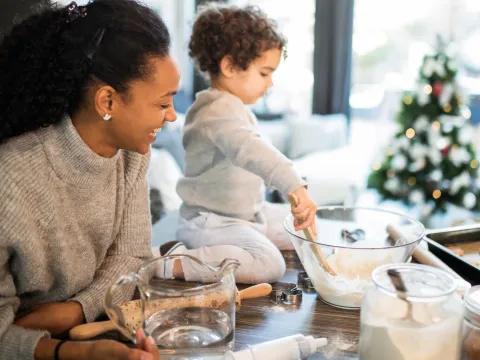- AdventHealth

All those gleeful songs, cheery commercials and sparkles in the eye can paint the perfect picture of holiday happiness. But what happens when your tinsel gets tangled, leaving you feeling stressed and down-right frustrated?
The first thing to do is realize that stress and anxiety are completely normal around the holidays, explains Catherine Nesov, a licensed mental health counselor at AdventHealth's Center for Behavioral Health.
Nesov explains why the holidays can be emotionally trying and offers some tips to support your whole health body, mind and spirit.
Top Holiday Stress Culprits
1. Unmet Expectations
"One of the biggest culprits for stress is one's unmet expectations; if your expectations are high and you don't achieve them, you can get stressed out or unhappy," says Nesov.
For example, if your expectation is for your family to all get along this year with no arguments, but this has been an issue in the past, this might not be a realistic mindset. Nesov advises setting expectations that are appropriate and based on the past, what you know about yourself and your personal limitations.
2. Pressure to Be Happy
Nesov explains, "There's a lot of pressure in our culture and the media that the holidays are this perceived happy, joyful time for everyone, where we all are grateful and thankful for what we have. But the holidays can also be a reminder of what we don't have, like not having enough money, the family or partner you wanted or a particular relationship with a family member. Unfortunately, the holidays can spark reflection around what is missing in your life, which can be sad."
3. Reminders of Loss
"The holidays can be a time where people are hyper-aware of emotional difficulties, such as a loved one not being there because they passed away. If one hasn't grieved completely or is experiencing a loneliness or loss of any kind, the holidays could be an opportunity for unattended emotional issues to surface in the conscious mind," Nesov describes.
How to Know When Stress is Too Much
One of the most important things you can do is check in with yourself frequently and identify your feelings. One way to do this is mindfulness.
Mindfulness is awareness. "If you are really distracted or so busy and stressed out that you don't realize what feelings are manifesting, you cant acknowledge them and do something about them," says Nesov.
She adds that a healthy amount of stress or sadness comes with the holidays. However, when these negative feelings impede on your life, causing you to fall behind in meeting your daily responsibilities, argue with your partner frequently or spend too much money, these are red flags that your stress could be affecting your wellness and life functioning. And if this becomes your reality, it's recommended to talk to your doctor and seek help.
Tips for Managing Holiday Stress
In addition to setting realistic expectations around the holidays and checking in with your emotions, Nesov offers some additional exercises to keep your body, mind and spirit in top shape.
1. Mindful Breathing
There are specific techniques, but in sum, mindful breathing involves taking some quiet time to refocus on yourself and your body through breathing. You inhale for a period of time, hold your breath and then exhale for longer than you inhaled. You can do this consistently until you feel calmer.
"Deep breathing is basic brain science; it's a proven way to calm your body and your mind," says Nesov.
2. Progressive Muscle Relaxation
Progressive muscle relaxation helps you to be mindful of your body. It involves taking a moment to scan your entire body (head to toe), checking in with each area to feel where there is tension or discomfort.
Nesov adds,"Progressive muscle relaxation is a way of checking in with your body to find areas where you can release some tension so it doesn't have to physically carry the stress. "
You can also do stretching exercises to help reduce stress, release tension and support the body-mind connection.
3. Meditation
"Mindfulness is like a muscle in your brain; the more you use it the stronger it gets, and it even eventually happens automatically," explains Nesov.
And meditation is one way to train your brain to be in a calmer, more present state. If you practice some meditation using some guided apps or an exercise you develop on your own you can master your mindfulness and be prepared for the holidays.
4. Planning
"When you plan, you have a greater sense of control. Planning allows you to get better at setting boundaries for yourself and others," comments Nesov.
Around the holidays, many people have expectations for you, whether it's attending a party or family gathering. Nesov adds, "Know that it's okay to say no and do less."
If your plan and to-do list is a mile long, is it possible to be mindful or calm while doing that list? Probably not. And that's your signal to make adjustments for your health and well-being.
She adds, "I tell my clients that self-care is the priority its okay to be selfless and give back to your health, and if you have to walk away from a triggering conversation or leave a party early, it's okay to do that because your wellness matters."
5. Practicing Gratitude
Nesov advises, "When we are mindless and stressed out, it's easy to forget what we are grateful for; so, gratitude is an effective anecdote for stress and depression."
Practice a gratitude by taking just one minute a day to write down all of the things of which you are appreciative of or grateful. This helps refocus your mind on the positive things that you have in your life.
6. Being Present
"Take moments to be present around the holidays. You can do this anywhere and anytime. Focus all of your attention on something positive; it could be engaging with a family member, making cookies, or even holiday shopping, but try not to let other thoughts and stressors affect that moment," recommends Nesov.
7. Having Support
Nesov advises that if it's hard for you to be around a family member or friend, make sure you have a support system around you. Have a friend ready to text or call, or someone who can go with you to an event that you think will be emotionally uncomfortable.
8. Realizing That Your Holiday Stress is Normal
Nesov concludes, "I can't emphasize enough how much normalcy there is in experiencing stress around the holidays you are not alone. If we all walked around with stress meters over our heads, you'd see just about everyone's meter giving off higher-than-normal stress levels. Allow that to help validate your feelings."
She explains that sometimes people can take on shame identity, that they can't handle the seasonal stress like others, or that there is something wrong with them.
While the holidays are a time to reflect and set goals to make personal improvements, it's also a time to be kind to yourself.
And if you need a little extra support, the clinicians of AdventHealth's Center for Behavioral Health can help. Call Call855-303-DOCS today to schedule an appointment.



